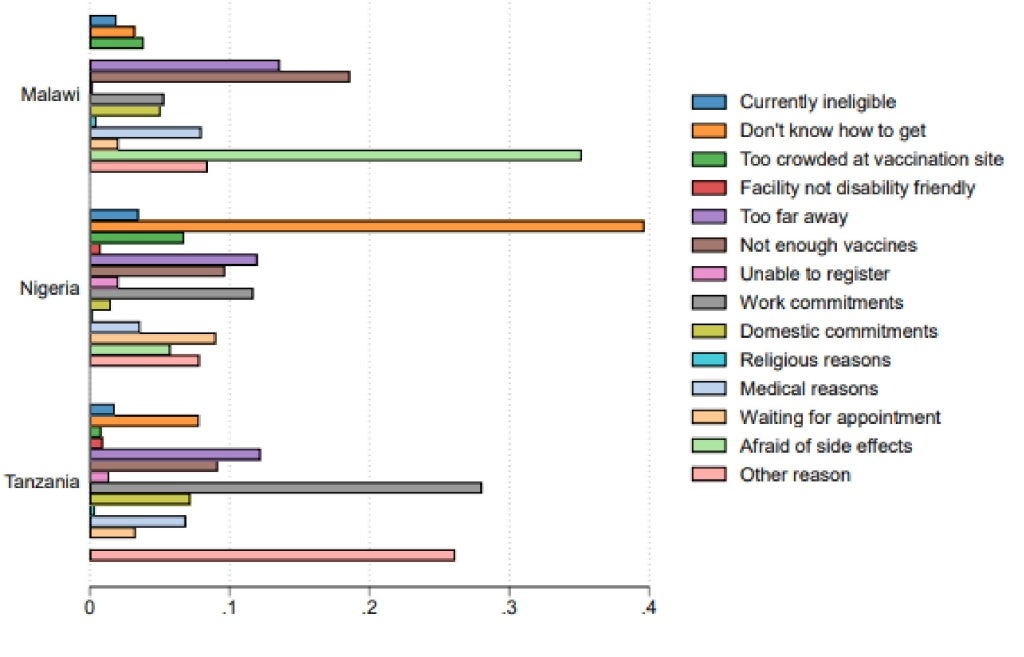 Photo by Jeremy Bishop on Unsplash
Photo by Jeremy Bishop on Unsplash
This blog is a biweekly feature highlighting recent working papers from around the World Bank Group that were published in the World Bank’s Policy Research Working Paper Series. This entry introduces five papers published in August 2022 on various topics, including COVID-19 vaccinations, tax compliance, conflict, and child marriage among others.
The first two papers examine COVID-19 vaccinations. In Intra-Household Dynamics and Attitudes toward Vaccines: Experimental and Survey Evidence from Zambia, Christopher Hoy and coauthors explore how intra-household dynamics relate to attitudes toward vaccines in low- and lower-middle-income countries. In Turning COVID-19 Vaccines into Vaccinations: New Evidence from Sub-Saharan Africa, Philip Wollburg and coauthors present new evidence on COVID-19 vaccine hesitancy, uptake, last-mile delivery barriers, and potential strategies to reach those who remain unvaccinated.
-
Intra-Household Dynamics and Attitudes toward Vaccines: Experimental and Survey Evidence from Zambia draws on two novel data sources from Zambia to explore how intra-household dynamics relate to attitude towards vaccines. The first is a nationally representative, in-person survey of more than 10,000 households that asked all household members individually about their willingness to get a COVID-19 vaccine. The second is a randomized survey experiment with almost 3,000 social media users that tested how the impact of information about the benefits from receiving a COVID-19 vaccine on people’s willingness to get vaccinated varied based on intrahousehold dynamics. The paper shows that people’s willingness to get a COVID-19 vaccine was very strongly associated with whether other household members were also willing. The experiment found that respondents who received information emphasizing either individual or household benefits from getting a COVID-19 vaccine were around 20 percent more willing to get vaccinated than those in the control group.
-
Turning COVID-19 Vaccines into Vaccinations: New Evidence from Sub-Saharan Africa uses data from high-frequency phone surveys in five countries in East and West Africa (Burkina Faso, Kenya, Malawi, Nigeria, and Tanzania) to show that across the study countries, a majority is willing to get vaccinated but that hesitancy among those unvaccinated is a non-negligible issue. Figure 1 below shows reasons preventing people from getting a vaccine. Most of these reasons have to do with ease of access.
Figure 1: Reasons for pending vaccination despite being willing to get vaccinated

The next two papers also take us to sub-Saharan Africa on topics related to property tax and job and income losses because of COVID-19. In Property Tax Compliance in Tanzania: Can Nudges Help?, Vincenzo Di Maro and coauthors explore how a text message campaign promotes tax compliance. In Inequalities in Job Loss and Income Loss in Sub-Saharan Africa during the COVID-19 Crisis, Amparo Palacios Lopez and coauthors use high-frequency phone survey data from Ethiopia, Malawi, Nigeria, and Uganda to analyze the impacts of the COVID-19 crisis on work (including wage employment, self-employment, and farm work) and income.
-
Property Tax Compliance in Tanzania: Can Nudges Help? investigates the impact of a series of reminders via text message that leverage different aspects of citizens’ voluntary motivation to pay property taxes . Landowners were randomly assigned to one of four groups designed to test different aspects of tax morale. They received a simple text message reminder to pay their tax (a test of salience), a message highlighting the connection between taxes and public services (reciprocity), a message communicating that people who did not pay were not contributing to local or national development (social pressure), or no message (control). Recipients of any message were 18 percent (or 2 percentage points) more likely to pay any property tax by the end of the study period. Each type of message resulted in gains in payment rates, although social pressure messages delivered the lowest gains. Total payment amounts were highest for those who received reciprocity messages. Nudges were most effective in areas with lower initial rates of tax compliance.
-
Inequalities in Job Loss and Income Loss in Sub-Saharan Africa during the COVID-19 Crisis uses high frequency phone survey data from Ethiopia, Malawi, Nigeria, and Uganda to analyze the impacts of the COVID-19 crisis on work (including wage employment, self-employment, and farm work) and income, as well as heterogeneity by gender, family composition, education, age, preCOVID-19 industry of work, and between the rural and urban sectors. The authors find significant inequalities in the labor market impacts of the COVID-19 pandemic. During the first months of the pandemic, women were more likely to lose their job than men and job loss was concentrated among young respondents and in urban areas . The evidence also suggests that the disproportionate job loss among women was not primarily driven by increased childcare demands related to school closures. Job loss over the full year (Figure 2A) ranged between 30% and 73%. In all countries except Ethiopia, the one-year rate of job loss is about ten percentage points higher than early-phase job loss. This indicates that while most job loss occurred in those first few months of the pandemic, it continued after July 2020. By February/March 2021, 14 to 23 percent of respondents who were working pre-COVID-19 were out of work (Figure 2B) and on average, pre-COVID-19 workers were jobless for around 2 months during the first year of the pandemic (Figure 2C).
Figure 2: One-year labor market indicators
The last two papers touch on topics related to child marriage and the always timely topic of carbon emissions. In Conflict and Girl Child Marriage: Global Evidence, Diana Jimena Arango and coauthors estimate the relationship between conflict and child marriage. In Informal Emissions, Shoghik Hovhannisyan and coauthors estimate the relationship between both CO2 and non-CO2 emissions per value added and the informal sector measured as the share of informal workers in total across countries.
-
Conflict and Girl Child Marriage: Global Evidence uses Demographic and Health Survey data from 19 conflict-affected countries to estimate the relationship between conflict and child marriage . The findings are mixed; in some countries conflict is associated with an increase in child marriage, in others it is associated with a decrease in child marriage, and in some cases, there is not a statistically significant relationship.
-
Informal Emissions studies the relationship between the informal economy and CO2 and non-CO2 emissions in developing countries using informal employment as a proxy for the informal economy and emissions per value added. The estimates indicate that emissions per value added in the informal sector are higher as opposed to in the formal sector. At the sector level, higher informality is associated with lower CO2 emissions per value added only in manufacturing and other services sectors.
The following are other interesting papers published in August. Please make sure to read them as well.




Join the Conversation